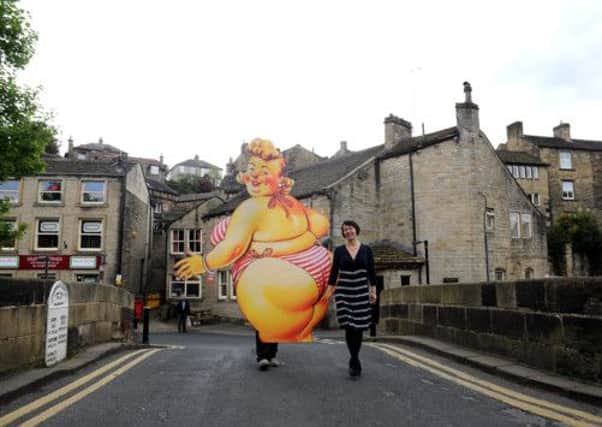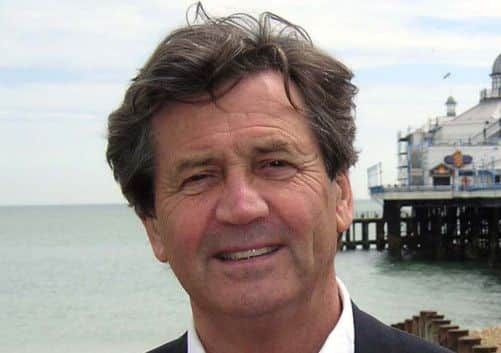From music to comedy, the festivals bringing fringe benefits to Yorkshire


THERE was a time when Yorkshire’s cultural calendar was dominated by a handful of flagship festivals and events.
But now barely a week goes by without some kind of festival taking place, whether it’s to do with art, music, literature or comedy, or sometimes even all four.
Advertisement
Hide AdAdvertisement
Hide AdThere are of, of course, the well established big hitters, such as Ilkley Literature Festival, Sheffield Doc/Fest and the Theakstons Old Peculier Crime Writing Festival in Harrogate, to name just three.


But I could easily fill this whole page simply listing the arts festivals taking place in Yorkshire this year, and they’re popping up not just in our bigger towns and cities. Morley in Leeds has its own successful literature festival, as does Headingley just up the road, and Helmsley in North Yorkshire.
This month alone sees three arts festivals get underway in Hebden Bridge, Holmfirth and Grassington, but this barely scratches the surface of what’s happening.
“From a local authority point of view they’re seen as a really good way of engaging with the harder- to-reach parts of communities, especially the free festivals,” says Kim Hart, co-ordinator with the British Art Festivals Association.
Advertisement
Hide AdAdvertisement
Hide Ad“I think people have also realised that it’s possible to start something on a small scale if it’s run by a dedicated group of volunteers. This has come on the back of the fact that more people in the arts world are working as freelancers now. There’s an element, too, of people preferring something smaller and more intimate than some of the really big festivals, because it adds to the whole experience.”
The rise in the number of festivals over the last five or six years has coincided with a financial crisis and a backdrop of deep funding cuts in the arts sector.
“Some festivals have collapsed under the weight of financial constraints which have eaten away up any funding reserves they may have had,” admits Hart.
“But a lot of smaller festivals operate outside the Arts Council’s horizon, they’re supported by local businesses who benefit from a bit publicity themselves and the life cycle of these festivals, which are very much part of their community, is often longer than bigger ones that are parachuted into a community.
Advertisement
Hide AdAdvertisement
Hide Ad“They might get started around a kitchen table by a group of like-minded individuals who run them as volunteers and after a couple of years they bring in a part-time administrator. These are the festivals that can weather the difficult financial climate because they aren’t beholden to outside grants from local authorities and the Arts Council.
“Instead, they’re a product of their local community run by the people who live there.There’s a growing DIY ethos and for every large, established festival that fails there are five more that form in its wake.”
Once they’ve proved they can put bums on seats, festivals can quickly attract some big names that gives them a bit of kudos and, in turn, helps ticket sales ticking over nicely. But what’s in it for the writer, comedian or artist? As lovely as they are, you’ve got to go out of your way to travel to places like Bridlington and Hebden Bridge.
“If you’re an author then festivals are a very good way of publicising your books to a wider audience. It’s the same with music because there’s a burgeoning interest in in live performance at the minute,” adds Hart.
Advertisement
Hide AdAdvertisement
Hide AdFiona Goh, festival director of the Holmfirth Arts Festival, which has this year secured sponsporship from the saucy postcard company Bamforth & Co, believes arts events are a way of boosting the image of a town and bringing people together.
“They’re used for cultural tourism and also as a way of re-branding a place. They’re also a good way of helping establish a sense of identity and the best ones reflect the history of a place, which is what we try and do in Holmfirth.”
The arts festival, which opens today and runs to June 23, was set up five years ago and has grown steadily with Mark Thomas, Andy Kershaw, jazz pianist Django Bates and the International Mambo Orchestra among the line-up this year.
“It was run by volunteers to begin with and it started because people in Holmfirth wanted to showcase the creative work that was going on in the valley,” she says.
Advertisement
Hide AdAdvertisement
Hide AdThe festival has grown since then but Goh points out that arts festivals don’t have to be giant behemoths in order to succeed.
“They’re a way of saying something interesting and unusual about a place and can act as a catalyst. Festivals used to be seen as being a bit like fireworks, they come and go, but the best ones aren’t like that, they have a lasting impact.”
The York Festival of Ideas, which runs until June 29, was set up by the city’s university and has been a huge success. It started as a pilot event in 2011, with 24 events over nine days, but now has more than 30 partners and last year attracted more than 20,000.
This year’s programme, which includes many free events, features headline speakers like Seamus Heaney, Melvyn Bragg and Michael Wood.
Advertisement
Hide AdAdvertisement
Hide AdThe festival’s director, Joan Concannon, says ticket sales have been going well. “What’s interesting is that people seem just as excited about coming to hear a debate about the Welfare State as they are about seeing big hitters like Seamus Heaney. We’re extraordinarily lucky in Yorkshire because it’s an amazing place and the audiences here are very culturally mature.
“I think we have a much better understanding in times of adversity about the importance of bringing people together to share ideas and experiences. It sounds a bit corny, but it’s life-affirming.”
The Festival of Ideas isn’t the only event starting this week. The annual Bridlington Poetry Festival opens tomorrow, featuring three days of performances, talks and film screenings.
The festival was set up in 2010 and this year Ian McMillan, Jo Shapcott and Don Paterson are among the poets taking part. Its artistic director, Leeds-based poet Antony Dunn, says the festival has boosted the seaside town.
Advertisement
Hide AdAdvertisement
Hide Ad“Bridlington was ripe for something like this. It’s close to Scarborough and Hull but there wasn’t really anything flying the flag for the town.”
Which is where the idea for the festival came in. “There are some great poets in East Riding and this was a way of making them a focal point as well as bringing in some of the best poets from around the world and the UK.”
He agrees that there is a growing appetite among audiences for smaller festivals.
“I think more people want the smaller, more intimate experience, as well as something that’s local. That’s what it feels like in Bridlington where the festival’s very much a part of the community.”
Advertisement
Hide AdAdvertisement
Hide AdBut poetry, for all its intrinsic worth, isn’t a big money business so it must be a challenge to make it sustainable, especially in the current economic climate?
“It is difficult. We’re proud at Bridlington that we pay writers a decent fee, but that’s expensive when you’ve got 30 poets over one weekend.”
It means they rely heavily on Arts Council funding as well as support from East Riding Libraries, among others. But this funding means as part of their work they’re able to run poetry workshops in schools and encourage children to take part in the festival itself.
“We get some schoolchildren to come and perform work in front of real festival-goers, because the idea is to show them that they can achieve something that other people are interested in.
Advertisement
Hide AdAdvertisement
Hide Ad“They’re as nervous as anything when they’re standing up on stage performing their poems, but when you seem them beaming with delight after they get a round of applause, it’s just brilliant,” he says.
“That’s why arts festivals are so important for local communities, they give people the chance to do things they wouldn’t have otherwise had the opportunity to do, and people treasure these memories for the rest of their lives.”
Ilkley Festival turning 40
One of Yorkshire’s longest established festivals celebrates its 40th anniversary this autumn.
Ilkley Literature Festival will mark the landmark with a new commission by Poet Laureate, Carol Ann Duffy and the unveiling of an exhibition which includes rare literature, previously unseen letters and a unique recording of poet, WH Auden.
Advertisement
Hide AdAdvertisement
Hide AdRachel Feldberg, festival director said: “It feels very fitting that Carol-Ann Duffy is writing a new poem to mark our 40th anniversary. The festival has a tradition of commissioning major poets and over the years we have welcomed the likes of Ted Hughes, Benjamin Zephaniah, Liz Lochhead and Tony Harrison.”
The festival runs from October 4 to 20.